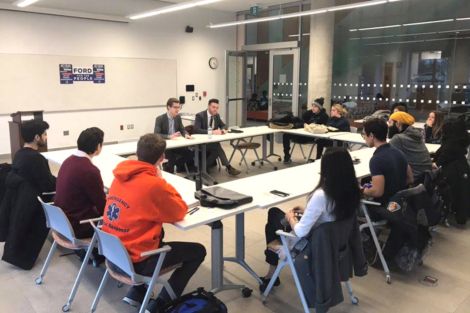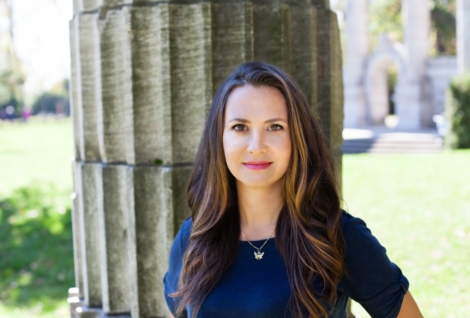Saints Ball no longer protected by Trinity’s saints
Re: “Trinity Saints Ball held off campus for first time”
Last year, there was an alleged assault at a Trinity College party by a campus police officer. This was followed by a vote of non-confidence by the student body in the administration, and the administration temporarily banning alcohol at campus events. Finally, it forbade paying for alcohol with student fees, effective September.
Rather than finding ways to prevent assault, the college administration put a band-aid over a massive wound. Previously, the handling of a sexual assault case by U of T and Trinity led to the survivor filing a human rights complaint. It seems like the college and university alike are keen on administering quick fixes rather than seeking to solve deeply rooted issues, which would take much more effort to address.
In the case of the alleged assault at the party that forced the move of big campus events to properly licensed venues off-campus, a campus police officer was alleged to have physically and verbally abused a student and behaved unprofessionally — much like the drunk and disorderly youth that police goes out of its way to discipline.
The young woman who alleged that the university and Trinity mishandled her sexual assault case claimed that the Assistant Dean of Students at Trinity told her that many had negative experiences with Campus Police — and, therefore, going to them would be a futile effort. There is a much deeper problem here, and that is not only the proper training of Campus Police, but also employing the best-suited people for the job.
Moving Saints Ball is a temporary fix to a massive underage drinking problem, but it doesn’t confront the bigger issue of those in authority using their power unjustifiably. Students are going to consume alcohol either way. Shouldn’t the administration be more worried about the students’ safety and host the ball under the watch of the college? Instead, it seems as if the college and university are more concerned about liability issues and lawsuits, which could easily be avoided if the people in authority were held accountable for their actions.
Varsha Pillai is a first-year Social Science student at University College.
Human decency defeats intolerance
Re: “Premier Ford rejects Ontario PC Party motion to debate recognition of gender identity”
Doug Ford’s rejection of his party’s motion to debate recognition of gender identity is welcomed province-wide. To many, including me, it is a saving pivot from a dangerous path set out by more fringe elements of the party. The motion politicizes sexuality, invalidates identities, and ostracizes minorities in our province by calling gender identity a “highly controversial, unscientific ‘liberal ideology.’”
There is also an irony to be noted here. Conservatism calls for small government and the protection of the private life of the citizen. However, this motion cracks into the private sphere to define their humanity. That is hardly respecting either small government or the private life of the individual.
I am a supporter of the Ontario Progressive Conservative Party and welcome debate where necessary. The party is a big blue tent. We encourage members to speak their minds on various topics. When their opinion may harm others, we say something. But I have never been one to support muzzling another’s voice before they have the chance to speak.
However, once they speak to motions like the one Tanya Granic Allen proposed, there comes a time for common sense and human decency to defeat ignorance and intolerance. Ford did just that, and I am glad to see him reject transphobia in this way. Well done, premier, on this decision.
Andrea Chiappetta is a second-year Political Science, American Studies, and History student at Woodsworth College.
Why we should all try to be a little more like Sam Oosterhoff
Re: “Progressive Conservative MPP Sam Oosterhoff speaks at UTSC round table on youth, politics”

ABHYA ADLAKHA/THE VARSITY
Sam Oosterhoff is the youngest MPP to have ever been elected. In his recent visit to UTSC, he attended an event with the Ontario Progressive Conservative Campus Association, in which he discussed the importance of youth engagement with government.
A lot of young people have a flippant approach to politics. In this new technological era, there’s a sudden shift of importance. While there are still students interested in the governance of this country, too many youth simply don’t care because ‘it’s all politics.’ Some claim that we should ‘leave it to politicians.’ But politicians are just normal people with fancy titles and big vocabularies.
As a young person, I can’t stress the importance of student involvement in politics enough. It’s tiring to see most policymakers as extremely educated, older people. Those politicians convince young people you must have a Harvard education to be considered reputable. Therefore, it is inspiring to have a 21-year-old MPP in power representing Niagara West—Glanbrook.
Oosterhoff was just a kid with a passion for politics and a desire to make a difference. He took his ideas and found a platform to promote them. In his discussion with UTSC students, he talked about those who thought he would “trip over his shoelaces” and “fall flat on his face.”
What those people don’t understand is that a powerful voice comes from within; it is not mined from a good pedigree or numerous accolades. A person’s voice cannot be stifled by their age or lack of experience. Oosterhoff proves that anyone can contribute to the politics of this country. There aren’t enough youth engaged in political discussion. Everyone should aim to contribute in their own way, and let’s start with the students at U of T.
Grace Meany is a third-year English, Political Science, and Professional Writing & Communications student at UTM.



